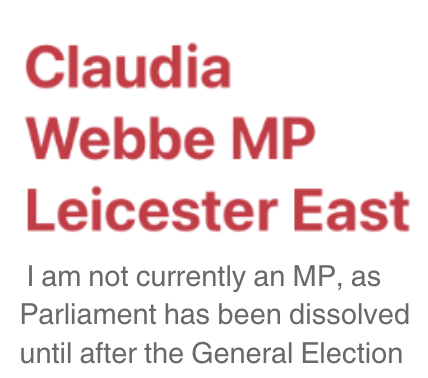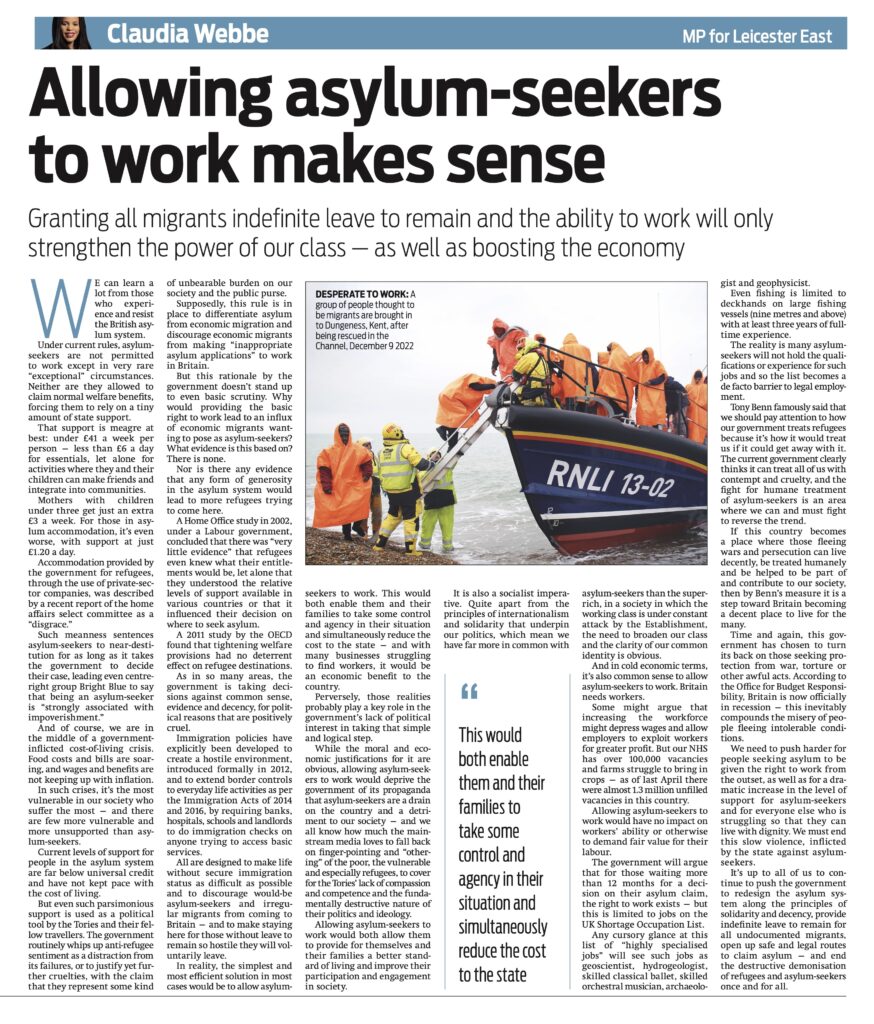Allowing asylum-seekers to work make sense
By Claudia Webbe MP
Granting all migrants indefinite leave to remain and the ability to work will only strengthen the power of our class – as well as boosting the economy
We can learn a lot from those who experience and resist the British asylum system.
Under current rules, asylum-seekers are not permitted to work except in very rare “exceptional” circumstances. Neither are they allowed to claim normal welfare benefits, forcing them to rely on a tiny amount of state support.
That support is meagre at best: under £41 a week per person — less than £6 a day for essentials, let alone for activities where they and their children can make friends and integrate into communities.
Mothers with children under three get just an extra £3 a week. For those in asylum accommodation, it’s even worse, with support at just £1.20 a day.
Accommodation provided by the government for refugees, through the use of private-sector companies, was described by a recent report of the home affairs select committee as a “disgrace.”
Such meanness sentences asylum-seekers to near-destitution for as long as it takes the government to decide their case, leading even centre-right group Bright Blue to say that being an asylum-seeker is “strongly associated with impoverishment.”
And of course, we are in the middle of a government-inflicted cost-of-living crisis. Food costs and bills are soaring, and wages and benefits are not keeping up with inflation.
In such crises, it’s the most vulnerable in our society who suffer the most — and there are few more vulnerable and more unsupported than asylum-seekers.
Current levels of support for people in the asylum system are far below universal credit and have not kept pace with the cost of living.
But even such parsimonious support is used as a political tool by the Tories and their fellow travellers. The government routinely whips up anti-refugee sentiment as a distraction from its failures, or to justify yet further cruelties, with the claim that they represent some kind of unbearable burden on our society and the public purse.
Supposedly, this rule is in place to differentiate asylum from economic migration and discourage economic migrants from making “inappropriate asylum applications” to work in Britain.
But this rationale by the government doesn’t stand up to even basic scrutiny. Why would providing the basic right to work lead to an influx of economic migrants wanting to pose as asylum-seekers? What evidence is this based on? There is none.
Nor is there any evidence that any form of generosity in the asylum system would lead to more refugees trying to come here.
A Home Office study in 2002, under a Labour government, concluded that there was “very little evidence” that refugees even knew what their entitlements would be, let alone that they understood the relative levels of support available in various countries or that it influenced their decision on where to seek asylum.
A 2011 study by the OECD found that tightening welfare provisions had no deterrent effect on refugee destinations.
As in so many areas, the government is taking decisions against common sense, evidence and decency, for political reasons that are positively cruel.
Immigration policies have explicitly been developed to create a hostile environment, introduced formally in 2012, and to extend border controls to everyday life activities as per the Immigration Acts of 2014 and 2016, by requiring banks, hospitals, schools and landlords to do immigration checks on anyone trying to access basic services.
All are designed to make life without secure immigration status as difficult as possible and to discourage would-be asylum-seekers and irregular migrants from coming to Britain — and to make staying here for those without leave to remain so hostile they will voluntarily leave.
In reality, the simplest and most efficient solution in most cases would be to allow asylum-seekers to work. This would both enable them and their families to take some control and agency in their situation and simultaneously reduce the cost to the state — and with many businesses struggling to find workers, it would be an economic benefit to the country.
Perversely, those realities probably play a key role in the government’s lack of political interest in taking that simple and logical step.
While the moral and economic justifications for it are obvious, allowing asylum-seekers to work would deprive the government of its propaganda that asylum-seekers are a drain on the country and a detriment to our society — and we all know how much the mainstream media loves to fall back on finger-pointing and “othering” of the poor, the vulnerable and especially refugees, to cover for the Tories’ lack of compassion and competence and the fundamentally destructive nature of their politics and ideology.
Allowing asylum-seekers to work would both allow them to provide for themselves and their families a better standard of living and improve their participation and engagement in society.
It is also a socialist imperative. Quite apart from the principles of internationalism and solidarity that underpin our politics, which mean we have far more in common with asylum-seekers than the super-rich, in a society in which the working class is under constant attack by the Establishment, the need to broaden our class and the clarity of our common identity is obvious.
And in cold economic terms, it’s also common sense to allow asylum-seekers to work. Britain needs workers.
Some might argue that increasing the workforce might depress wages and allow employers to exploit workers for greater profit. But our NHS has over 100,000 vacancies and farms struggle to bring in crops — as of last April there were almost 1.3 million unfilled vacancies in this country.
Allowing asylum-seekers to work would have no impact on workers’ ability or otherwise to demand fair value for their labour.
The government will argue that for those waiting more than 12 months for a decision on their asylum claim, the right to work exists — but this is limited to jobs on the UK Shortage Occupation List.
Any cursory glance at this list of “highly specialised jobs” will see such jobs as geoscientist, hydrogeologist, skilled classical ballet, skilled orchestral musician, archaeologist and geophysicist.
Even fishing is limited to deckhands on large fishing vessels (nine metres and above) with at least three years of full-time experience.
The reality is many asylum-seekers will not hold the qualifications or experience for such jobs and so the list becomes a de facto barrier to legal employment.
Tony Benn famously said that we should pay attention to how our government treats refugees because it’s how it would treat us if it could get away with it. The current government clearly thinks it can treat all of us with contempt and cruelty, and the fight for humane treatment of asylum-seekers is an area where we can and must fight to reverse the trend.
If this country becomes a place where those fleeing wars and persecution can live decently, be treated humanely and be helped to be part of and contribute to our society, then by Benn’s measure it is a step toward Britain becoming a decent place to live for the many.
Time and again, this government has chosen to turn its back on those seeking protection from war, torture or other awful acts. According to the Office for Budget Responsibility, Britain is now officially in recession — this inevitably compounds the misery of people fleeing intolerable conditions.
We need to push harder for people seeking asylum to be given the right to work from the outset, as well as for a dramatic increase in the level of support for asylum-seekers and for everyone else who is struggling so that they can live with dignity. We must end this slow violence, inflicted by the state against asylum-seekers.
It’s up to all of us to continue to push the government to redesign the asylum system along the principles of solidarity and decency, provide indefinite leave to remain for all undocumented migrants, open up safe and legal routes to claim asylum — and end the destructive demonisation of refugees and asylum-seekers once and for all.
Claudia Webbe MP is the member of Parliament for Leicester East. You can follow her at www.facebook.com/claudiaforLE and twitter.com/ClaudiaWebbe



